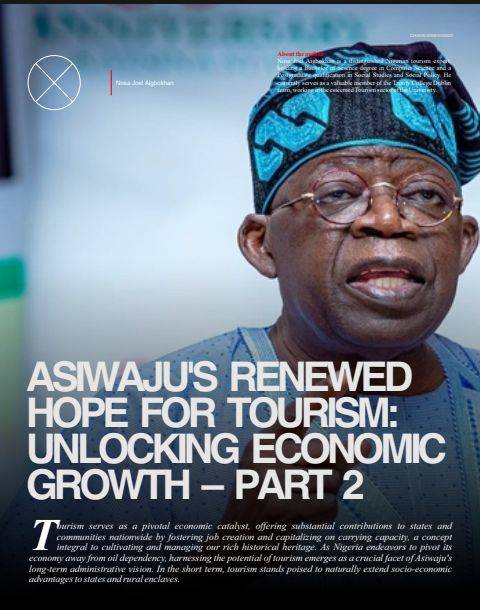By Nosa Joel Aigbokhan

Tourism serves as a pivotal economic catalyst, offering substantial contributions to states and communities nationwide by fostering job creation and capitalizing on carrying capacity, a concept integral to cultivating and managing our rich historical heritage. As Nigeria endeavors to pivot its economy away from oil dependency, harnessing the potential of tourism emerges as a crucial facet of Asiwaju’s long-term administrative vision. In the short term, tourism stands poised to naturally extend socio-economic advantages to states and rural enclaves.

This discourse centers on how both our natural landscapes and local communities can reap the rewards of tourism, leveraging its diverse components such as culture, sports, and entertainment. As underscored in the forward-looking manifesto of Tinubu – Shettima, this article delves into the potential that lies within renewed hope for tourism.
Cultivating a distinctive tourism brand holds the promise of nurturing rural tourism in Nigeria. The national tourism master plan, coupled with the blueprint for community tourism, can be synergistically developed, ensuring the sustainability of this vital sector. This strategy is pivotal in guaranteeing that the manifold benefits extend across all sectors of our states and local governments.
Intriguingly, research indicates that while production accounts for a quarter of job creation, the remaining 75% is attributed to support services. Unique to tourism, it stands as the only sector generating 100% of its employment through support services, setting it apart from other spheres of any global economy. Unlike most sectors in Nigeria, powered by public-private partnerships, tourism’s strength lies in the collaboration of the public, private, and people’s partnership (PPPP), serving as a potent vehicle for empowering individuals. A notable example is the symbiotic relationship between tourist attractions and local production, where communities adapt to cater to visitors’ needs.
To effectively execute strategies tailored to individual communities, as illuminated in the preceding article, the establishment of local government and state action plans becomes imperative. Within the first year of fostering a robust tourism brand, tangible progress can be witnessed through thriving destinations and exceptional visitor experiences across multiple states, as endorsed by visitor centers.
Amid the burgeoning demand for rural tourism in Nigeria, the onus rests on establishing sustained tourism carrying capacity, effectively channeling traffic from metropolitan centers to explore and capitalize on the bountiful potential of our natural heritage, cultural assets, national parks, inland waterways, and coastal regions. Notably, tourism plays an indispensable role in supporting rural communities.
As we align our nation’s trajectory with tourism as an employment driver in our communities, we can emulate the success stories of nations that have already reaped substantial rewards from diversifying away from oil dependency. As Nigeria charts its path toward economic diversification, the Tinubu – Shettima manifesto’s renewed hope underscores tourism’s pivotal role in nurturing a thriving national economy.
In the realm of tourism, the opportunities are boundless, reverberating across retailers, hospitality enterprises, activity providers, festivals, events, and attractions, forming an interconnected ecosystem that benefits communities at large.
In conclusion, the inception of any prosperous endeavor entails patience, and tourism is no exception. Realizing its potential will necessitate both financial investment and unwavering political commitment to establish essential infrastructure, direct footfall to attractions, promote these attractions and trails, facilitate affordable liability insurance for adventure tourism, and simplify the process of car rentals. Drawing inspiration from Tourism Ireland’s example, where car rentals contribute to extended stays and increased spending, Nigeria can strive to replicate this model, albeit acknowledging the challenges of car rentals within urban centers and rural locales.
ASIWAJU’S RENEWED HOPE FOR TOURISM: UNLOCKING ECONOMIC GROWTH – PART 2

